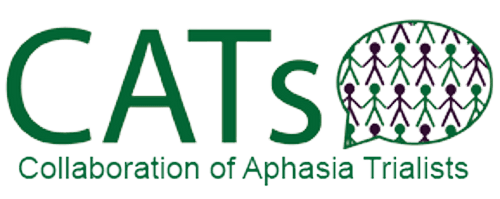About the Aphasia Therapy Finder
Getting started with the Aphasia Therapy Finder
Project funding and support
Phase I and Phase II of the Aphasia Therapy Finder project were funded by grants from The Tavistock Trust For Aphasia and supported in kind by the Collaboration of Aphasia Trialists.


Project team
Project lead: Professor Miranda Rose
Project officer: Cassie Wilcox
Project team: Dr Sam Harvey, Dr Jade Dignam, A/Prof Elizabeth Hoover, A/Prof Melanie Kirmess, Prof Bettina Mohr, Ms Katie Monnelly, Prof Evy Visch-Brink, Prof Sarah E. Wallace, Dr Lisa Bunker.
Software developer: https://www.shaarangtanpure.dev
Contact the Aphasia Therapy Finder project team: aphasiatherapyfinder@gmail.com
Background
Aphasia is a common communication disability resulting from damage to the brain (e.g. after stroke, brain tumor, traumatic brain injury) impacting the ability to speak, understand speech, read and write. These significant communication disabilities negatively impact everyday activities such as banking, shopping, and employment, but also people’s capacity to engage in family life, to socialise, and to develop and maintain friendships. Such impacts on everyday life can lead to mental health challenges with depression and anxiety being highly prevalent in people living with aphasia.
Aphasia therapy can reduce the level of impairment and disability, but aphasia is a highly varied condition so there is no “one size fits all” therapy approach. A variety of approaches exist and selecting a therapy can be a challenge for clinicians who may struggle to locate the best evidence to support selection of approaches. One significant barrier to implementation of best practice approaches is accessing the relevant therapy resources. Such resources include summaries of the evidence for the approach, instructions on how to carry out the approach in a clinical setting with a range of different client presentations, and the materials required to enact the approach. Further, some therapies have been developed or are only available in one language: work is required to translate these into other languages and house these translations in a globally accessible database.
The Aphasia Therapy Finder
The Aphasia Therapy Finder is a searchable database of common aphasia therapies. It provides easy access to therapy descriptions and resources for rapid implementation into clinical practice. The primary target audience is speech language pathologists. People who have aphasia may also find the Aphasia Therapy Finder useful in understanding different approaches and their evidence and be able to use that information in advocating for access to various therapy approaches. Students and other health professionals such as occupational therapists and psychologists may also be interested in the information in the Aphasia Therapy Finder. The current version of the Aphasia Therapy Finder includes information from all over the world. For consistency, British English has been used throughout. Future versions will be adapted to be accessible for people with aphasia and family members and will provide culturally and linguistically diverse content.
The Aphasia Therapy Finder aims to provide information on evidence-based aphasia therapies. We do not endorse any of the paid products listed within this database.
The NHMRC Evidence Hierarchy was used to classify the evidence level of each therapy. The majority of included studies are at Level III or above (that is, studies including control). Two exceptions are a treatment for apraxia of speech (SET) and mood and quality of life (Biographic Narrative Therapy).
Therapies in languages other than English, with at least level II evidence, will be included on the Aphasia Therapy Finder website.
Protocols and therapy materials will be placed on the Aphasia Therapy Finder website in both the primary language and English.
NOTE: Direct translation does not necessarily ensure that a treatment will work with the same level of efficacy in another language or another country – this would need to be tested empirically.
What are the features of the Aphasia Therapy Finder?
- Web-based, searchable repository of therapies
- Organised and searchable by:
- name of therapy (e.g. Semantic Feature Analysis)
- level of supporting evidence
- intervention target (e.g. speech, language, psychological wellbeing, participation, mood)
- linguistic level target (e.g. sound level, word level)
- target modality (e.g. speaking, writing, gesture, auditory comprehension)
- ICF domains (e.g. activity, personal factors)
- Detailed descriptions of the theoretical background and practical step-by-step methods for conducting the therapy
- Video examples of how to do the therapy
Thank you
The Aphasia Therapy Finder would not be possible without contributions from aphasia therapy experts around the world. We would like to thank the following therapy profile authors for sharing their expertise:
- Mahendra Advani
- Veera Anantha
- John Ashburner
- Pelagie Beeson
- Nicholas Behn
- Leo Bonilla
- Michelle Braley
- Sonia Brownsett
- Jade Cartwright
- Leora R. Cherney
- Erin Coho
- Henry Coley-Fisher
- Claire Cordella
- Sabine Corsten
- Jenny Crinion
- Stephanie Cute
- Sarah Grace Dalton
- Gayle DeDe
- Carrie Des Roches
- Mike Dickey
- Victoria Diedrichs
- Christie Carroll Duhigg
- Lisa Edmonds
- Victoria Fleming
- Julius Fridriksson
- Jason Godlove
- Jenna Griffin-Musick
- Friedericke Hardering
- Katerina Hilari
- Yean-Hoon Ong
- David Howard
- Honey Isabel Hubbard
- Diane Kendall
- Laura Kinsey
- Swathi Kiran
- Jürgen Konradi
- Kelly Krajeck
- Anna Krason
- Rupert Leach
- Alex Leff
- Jane Marshall
- Sally McVicker
- Ineke van der Meulen
- Jane Mortley
- Stephen Nadeau
- Davide Nardo
- Catherine Off
- Rebecca Palmer
- Cathy J Price
- Marie Andree Maegli Quezada
- Jessica D. Richardson
- Holly Robson
- Lewis Shapiro
- Victoria Scharp
- Erika Schimpf
- Cynthia Thompson
- Elizabeth Warburton
- Janet Webster
- Anne Whitworth

© 2026 Aphasia Therapy Finder. All rights reserved
Contact Us
